Unitarian Universalist music turns to exploration
Singing the Journey represents the arrival of a new a generation of Unitarian Universalism.
There is not a Bach chorale in the bunch. Almost everything presented at GA was accompanied with percussion. Songs are arranged in popular styles as various as folk, jazz, praise, gospel, and salsa. I am sure more than a few people at GA wondered if such music would translate to congregations with modest musical resources. (With tongue in cheek, I suggested to members of the task force that prepared the book that they issue a pianist and drummer with each copy.) But as several of the hymns we put in Singing the Living Tradition were challenging in style and content (I was part of the commission responsible for that hymnal), I have no issue with raising the bar.
Singing the Journey represents the arrival of a new generation of Uni¬tarian Universalism. The gray hymnal we’ve used for more than a decade was commissioned to integrate the forces swirling about Unitarian Universalism between 1961 and 1993—notably feminism, but also antiracism, multiculturalism, BGLT sexuality, and both the rational humanist and spiritual transcendentalist versions of liberal religion. It was, from the outset, a harmonizing project; we bragged in the foreword of retaining 40 percent of the material in the UUA’s 1964 hymnal.
By contrast, President William G. Sinkford commissioned Singing the Journey to explore, to get ahead of the generational curve. Young adults, for example, have been bringing a freedom about worship and music to their way of “doing church”—one that sees popular music and informality as normal, not exceptional. Addressing the culture of this new generation is the collection’s foremost task. The names of our two hymnals truly describe their nature: One is about singing the tradition, keeping the past alive in the best sense; the other is about singing the journey, moving us toward the future.
We live in an experiential age, a subjective time, and the new supplement reflects this. Move me emotionally, we are saying, and I will then move intellectually and morally. Inspiration is what we want. Singing the Journey provides it in spades.
Spirituality and worship are concocted things: cooked up as it were from elements of heart and mind. And like cooking itself, the best spiritual meals are sweet and savory, hot and cold, protein and carb, formed of many things that feed us in every way. Are we at a point in our collective maturity to feed ourselves wisely, or are we still so young as to gorge on sweets or go on spiritual juice fasts, to be susceptible to binges or purges as part of some denied spiritual eating disorder or undiagnosed substance issue?
I know this is a provocative image. For a generation I have implored Unitarian Universalists to be more evangelical in manner and form, but having seen it come to birth I left GA hungering for restraint and thought. They whom the gods would punish, said Oscar Wilde, are granted their prayers.
The Fire of Commitment
From the light of days remembered
burns a beacon bright and clear
Guiding hands and hearts and spirits
into faith set free from fear.
When the fire of commitment
sets our mind and soul ablaze
When our hunger and our passion
meet to call us on our way
When we live with deep assurance
of the flame that burns within
Then our promise finds fulfillment
and our future can begin.
—words by Mary Katherine Morn and Jason Shelton








